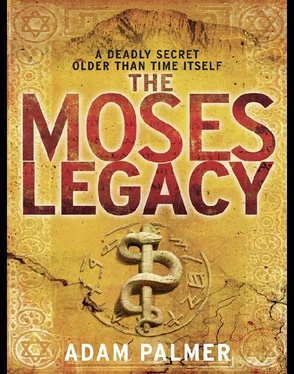Adam Palmer - The Moses Legacy
Здесь есть возможность читать онлайн «Adam Palmer - The Moses Legacy» — ознакомительный отрывок электронной книги совершенно бесплатно, а после прочтения отрывка купить полную версию. В некоторых случаях можно слушать аудио, скачать через торрент в формате fb2 и присутствует краткое содержание. Жанр: Триллер, на английском языке. Описание произведения, (предисловие) а так же отзывы посетителей доступны на портале библиотеки ЛибКат.
- Название:The Moses Legacy
- Автор:
- Жанр:
- Год:неизвестен
- ISBN:нет данных
- Рейтинг книги:4 / 5. Голосов: 1
-
Избранное:Добавить в избранное
- Отзывы:
-
Ваша оценка:
- 80
- 1
- 2
- 3
- 4
- 5
The Moses Legacy: краткое содержание, описание и аннотация
Предлагаем к чтению аннотацию, описание, краткое содержание или предисловие (зависит от того, что написал сам автор книги «The Moses Legacy»). Если вы не нашли необходимую информацию о книге — напишите в комментариях, мы постараемся отыскать её.
The Moses Legacy — читать онлайн ознакомительный отрывок
Ниже представлен текст книги, разбитый по страницам. Система сохранения места последней прочитанной страницы, позволяет с удобством читать онлайн бесплатно книгу «The Moses Legacy», без необходимости каждый раз заново искать на чём Вы остановились. Поставьте закладку, и сможете в любой момент перейти на страницу, на которой закончили чтение.
Интервал:
Закладка:
‘ Neferayim? Could that be a variant of Ay?’
‘I’ve never heard of him being called Neferayim.’
‘Okay, but could it have been Nefer -Ay? And then become Neferayim before becoming Ephraim?’
‘The word Nefer means “beautiful” and is a characteristic of female names in Egypt like Nefertiti and Nefertari.’
‘So you’re saying it’s only used for female names?’ asked Daniel.
‘Well no, there were a few men with “Nefer” in the name, like Neferhotep and Neferkheprure. And of course in those ancient times, they sometimes had several names.’
‘So maybe Ay could have had the alternative name of Nefer-Ay, which could then have become Neferayim?’
‘It’s possible,’ she conceded. ‘But like I said, in Egyptian writings he’s never been referred to as Nefer-Ay, let alone Neferayim.’
The priests sat there in silence throughout this exchange. They, at least, were perfectly happy to be patient. But now, the high priest leaned forward.
‘It’s consistent with what we know. Joshua was of the tribe of Ephraim, so Neferayim could be an alternative name for Ephraim.’
‘Okay, well let’s put that aside for now and see what else we can find here. You must understand that because I had to leave my notes behind when I made my escape from Egypt, I’m having to rely on my memory for this translation. You’ll have to be patient with me.’
He continued to read: Now one day Pharaoh was visiting the lands he had conquered in Syria and he went to the jail where the prisoners were kept and he saw the prisoner Joseph and he asked He broke off and looked at Gabrielle.
‘I’m Anglicizing the name. But just tell me one thing, does that fit the historical record?’
‘It could be true of several pharaohs. I think I have an idea which one it was, but I don’t want to say just yet. Carry on.’
Daniel looked down and continued translating, the words coming not in a flow, but almost in a burst of energy. He asked Joseph what crime he had committed and Joseph said that he had fought against Pharaoh and was defeated. But he said that he had been betrayed by his brothers who surrendered and offered him as a prisoner that their lives may be spared. He said that they were jealous of him because he wore a coat of many colours and they took his coat away from him when they delivered him into captivity.
Gabrielle was nodding enthusiastically at this. ‘A coat of many colours was a sign of leadership. It started with a people called the Hyksos who invaded Egypt 4,000 years ago and were driven out 500 years later.’
‘According to the Bible,’ said Daniel, ‘Jacob gave Joseph a coat of many colours, showing that he was the favoured son.’
‘And that made his brothers jealous,’ added one of the Samaritan priests.
Daniel carried on reading. Then Pharaoh told him that he too was in conflict with his brother, for his brother was older and had a greater claim to the throne. And Joseph told him to say to the people that he had had a dream and that in the dream the Sphinx spoke to him and told him to sweep the sand from his feet and that if he did this he would be king.
Daniel broke off, not because he couldn’t read any further but because Gabrielle was gripping his arm.
‘What is it?’ he asked.
‘The Dream stele,’ she choked.
‘What’s that?’
‘Thutmose the Fourth, the grandfather of Akhenaten, is believed to have visited Syria after conquering it… or reconquering it. He had an older brother, but somehow managed to gain power for himself. He then did some restoration work on the Sphinx and had this event commemorated in a small inscribed stone placed between the paws of the Sphinx. On the stone it described how he was out on a hunting trip when he fell asleep and had a dream. And in the dream the Sphinx spoke to him and told him that if he swept the sand away from its feet he would be made king. The stone is called the Dream stele and this passage fits in neatly with it.’
‘And I guess it also links up neatly with the idea that Joseph was an interpreter of dreams.’
‘Except that according to this account, he wasn’t so much the interpreter of dreams as the inventor.’
Daniel looked up at the priests to see how they were responding. This was presumably not what they wanted to hear. They were seeking confirmation of the Bible, not a rewriting of it – especially not one that cast their ancestor Joseph in a somewhat more cynical light. They did not look happy, but only one of them looked angry.
Daniel returned his attention to the manuscript before him. And Pharaoh saw that Joseph was a wise man and he told him that if he agreed to serve him he would give him his freedom and he agreed. And so Pharaoh ordered the jailer to set him free and made him his adviser. And there was a great harvest that year and Pharaoh and the people were happy. But Joseph advised him that God’s will was like the seasons and that God’s bounty would not always be with him. And he said to Pharaoh ‘Build storehouses for the grain and save some of the grain because the years of plenty will be followed by famine.’
Daniel looked up at the priests. They seemed a lot happier at this. He carried on reading: And Joseph was saddened by the idolatry of the Egyptians and he said to Pharaoh: ‘What use is it to you to have many gods? Do you have many kings? Is it not better to have one god, just as you are one king?’ And Pharaoh saw great wisdom in Joseph’s words. But he was troubled, for the people were accustomed to many gods.
Daniel looked up again to see the looks on the faces of the Samaritan priests: a mixture of joy and stunned surprise.
Chapter 76
‘I’m looking for some friends of mine,’ said Goliath, holding up the pictures of Daniel and Gabrielle that he had downloaded from the Internet and printed out.
He was in Holon, randomly accosting people, especially but not exclusively those wearing traditional Samaritan costume. He saw a group of them coming towards him.
‘Excuse me, I wonder if you can help me. I’m looking for a couple of friends of mine – a man and a woman. I know they were here yesterday and I am very anxious to find them.’
He held out the pictures. The group looked at them but showed no sign of recognition. Then one of them said, ‘I think I saw them. Ask Rabbi Tsedaka.’ The young Samaritan pointed. ‘He should be in the synagogue.’
Goliath thanked him and walked on. The Samaritan synagogue was in fact just down the road.
‘Excuse me,’ he said to a man, ‘I am looking for Rabbi Tsedaka.’
‘He’s in the office,’ said the man, pointing the way.
Goliath made his way to the office and knocked on the door.
‘Come in,’ said a voice from inside.
Goliath opened the door and entered. Aryeh Tsedaka was sitting at the desk, writing, his face creased in great thought.
‘Sorry, I’ll be with you in a moment. I’m just working on my sermon.’
But Goliath was not prepared to wait. ‘I’m looking for some friends of mine,’ he said, pushing the photo towards Tsedaka.
The look of recognition in the rabbi’s eyes was immediate. Which made his answer all the more surprising.
‘I’m afraid I don’t recognize them.’
Had they told him about the attempt to kill them?
However much or little this man knew, it was obvious that he was protecting them and had no intention of co-operating.
‘Could you take another look?’ Goliath requested, with an eager look in his eyes.
The rabbi leaned forward as if going through the motions of considering the question again. It was all that Goliath needed. He reached out and grabbed Tsedaka’s head and smashed it into the desk. It made a muffled thud, but the cry that followed was loud enough to be heard, and Goliath feared that he would attract attention. He lifted Tsedaka’s head with one hand and clamped a hand over his mouth with the other, making it hard for Tsedaka to breathe let alone speak. He could see the terror in the rabbi’s eyes.
Читать дальшеИнтервал:
Закладка:
Похожие книги на «The Moses Legacy»
Представляем Вашему вниманию похожие книги на «The Moses Legacy» списком для выбора. Мы отобрали схожую по названию и смыслу литературу в надежде предоставить читателям больше вариантов отыскать новые, интересные, ещё непрочитанные произведения.
Обсуждение, отзывы о книге «The Moses Legacy» и просто собственные мнения читателей. Оставьте ваши комментарии, напишите, что Вы думаете о произведении, его смысле или главных героях. Укажите что конкретно понравилось, а что нет, и почему Вы так считаете.












